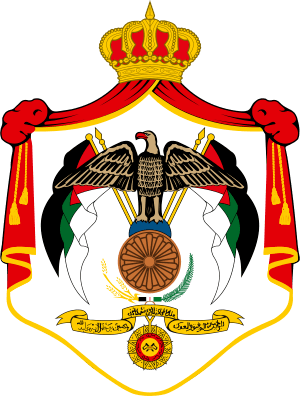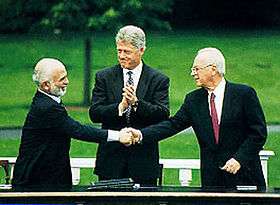Foreign relations of Jordan
 |
|---|
| This article is part of a series on the politics and government of Jordan |
|
|
|
Related topics |
|
|
The foreign relations of Jordan have consistently followed a pro-Western foreign policy and traditionally Jordan has had close relations with the United States and the United Kingdom. These relations were damaged when Jordan proclaimed its neutrality during the Gulf War and maintained relations with Iraq. In public, Jordan continued to call for the lifting of UN sanctions against Iraq within the context of implementing UNIC resolutions.
Since the end of the war, Jordan has largely restored its relations with Western countries through its participation in the Middle East peace process and enforcement of UN sanctions against Iraq.
Jordan signed a non-aggression pact with Israel (the Washington Declaration) in Washington, DC, on July 25, 1994. Jordan and Israel signed a historic peace treaty on October 26, 1994, witnessed by President Clinton, accompanied by Secretary Christopher. The U.S. has participated with Jordan and Israel in trilateral development discussions during which key issues have been water-sharing and security; cooperation on Jordan Rift Valley development; infrastructure projects; and trade, finance, and banking issues.

In 1996, the United States added Jordan to their major non-NATO ally agreement. Jordan was involved in the CIA–led Timber Sycamore covert operation to train and arm Syrian rebels.[1]
Jordan also participates in the multilateral peace talks, and recently Jordan has signed a free trade agreement with the United States. Jordan is an active member of the UN and several of its specialized and related agencies, including the Food and Agriculture Organization (FAO), International Atomic Energy Agency (IAEA), and World Health Organization (WHO). Jordan is a member of the World Bank, International Monetary Fund (IMF), Organisation of Islamic Cooperation (OIC), Non-Aligned Movement, and Arab League.
Within the context of the European Union's "European Neighbourhood Policy" the EU and Jordan have jointly adopted an Action plan to reinforce their political and economic interdependence, and further implement their current Association Agreement. This Action Plan covers a timeframe of three to five years and will encourage and support Jordan’s national reform objectives and further integration into European economic and social structures.
Israel captured Jerusalem in 1967, which is located at the West Bank of Jordan. Since 1967 Pakistan has been demanding its vacation at the international level. Jordan together with Pakistan is playing an effective role in the Organisation of Islamic Cooperation (OIC).
Bilateral relations
| Country | Formal Relations Began | Notes |
|---|---|---|
| 18 June 1996 |
| |
| ||
|
In May 2008, King Abdullah II visited Brunei, to bolster ties between Jordan and the southeast Asian nation, as well as discuss issues facing the Muslim world. Along with Sultan of Brunei Darussalam, Abdullah signed agreements devised to enhance cooperation in the economic, tourism and defense fields.[2] | ||
| ||
| ||
| ||
See Egypt–Jordan relations
| ||
See Greece–Jordan relations
| ||
| See Holy See–Jordan relations
Both countries established diplomatic relations in 1994. The Holy See has a nunciature in Amman. Jordan has an embassy in Rome accredited to the Holy See. The Holy See has maintained comparatively good relations with Jordan. The name of the country comes from the Jordan River, which is significant to Christians because it was the place where Jesus was baptized by John the Baptist. Various Christian clerics in the Arab world have a Jordanian background, such as Maroun Lahham in Tunisia and Fouad Twal in Palestine. | ||
|
The Republic of India and the Hashemite Kingdom of Jordan signed their first bilateral agreement for cooperation and friendly relations in 1947, which was formalised in 1950 when India became a sovereign democratic republic.[5] The Ministry of External Affairs of the Government of India stated in August 2011 that, 'India and Jordan have very warm, cordial and cooperative relations; and it is our hope that the existing mutually beneficial relationship would be further deepened and strengthened in the days ahead.'[6] Indian tourists visited Jordan in large numbers in 2010, with nearly 51,000 visitors. Apart from this, military, cultural and economic exchanges between the two nations is widespread. Quoting the Indian Foreign Ministry, 'India was the largest export partner and ninth largest import partner of Jordan in 2008. The trade turnover between the two countries stood at US$1.785 billion in 2008 i.e. Jordan’s imports from India stood at about US$503 million in 2008 while its exports to India reached at US$1.283 billion in 2008. India’s position in 2009 is third and fifteenth respectively as the trade turnover between the two countries stood at US$983 million in 2009 i.e. India’s exports to Jordan in 2009 stood at US$297 million while imports were valued at US$686 million. In 2010, the India-Jordan trade volume stood at US$1.16 billion i.e. India’s exports to Jordan stood at US$382 million in 2010 while imports were to the tune of US$783 million in 2010.'[6] Jordan is also a member of the Non-Aligned Movement and has thus forged close relations with India. | ||
| See Iraq–Jordan relations
Despite periodic crises of confidence and lingering Iraqi resentment over Jordan's close ties with Saddam Hussein, the two countries have managed to forge deep ties, in fact, Jordan has taken the lead among Arab states to do so. In the face of repeated attacks and threats, Jordan has maintained a strong diplomatic presence in Baghdad. The economic impact of the Iraq crisis in Jordan has been mixed. Jordan has benefited greatly from serving as a "gateway" to Iraq for governments, aid workers, contractors, and businesspeople, the real estate and banking sectors are booming, and it stands to reap more benefits from increased trade and transport should the situation in Iraq improve. However, with the fall of Saddam Hussein, Jordan lost the sizable oil subsidies and customary shipments it received from Iraq.[7] Unlike many of Iraq's other neighbors, Jordan can claim only modest influence over developments in Iraq. The kingdom does have notable intelligence capabilities vis-à-vis Iraq, and it reportedly helped the United States track down and kill Al-Qaeda in Iraq leader Abu Musab al-Zarqawi. Although some Jordanians highlight cross-border tribal and family connections with Iraqi Sunni Arabs, they pale in comparison to those of the West Bank, Lebanon, and Syria. Jordan's most significant means of influence is its hosting of a large and ever-changing Iraqi expatriate community, mostly of Sunni Arab origin. | ||
| 1994 | See Israel–Jordan relations
Jordan and Israel have had official relations since 1994, when their leaders signed a peace treaty.[8] Historically, Jordan has had relatively warm relations with Israel compared to other Arab nations. Jordan and Egypt are the only two Arab nations to have signed a peace treaty with Israel. | |
| 5 June 2013 |
Jordan recognised the independence of the Republic of Kosovo on 7 July 2009.[9] Jordan supported Kosovo at the International Court of Justice's advisory opinion on Kosovo's declaration of independence in December 2009.[10] Jordan and Kosovo established full diplomatic relations on 5 June 2013.[11] | |
|
Kuwait's relations with Jordan weakened during the Gulf War because of Jordan's stand with Iraq. However, the two nations have apparently decided to bury the past. King Abdullah II and the Emir of Kuwait are working to restore good relations and further strengthen them. | ||
| ||
| See Jordan–Malaysia relations
Jordan has an embassy in Kuala Lumpur,[12] and Malaysia has an embassy in Amman.[13] Relations between the two countries are mainly in economic and Islamic affairs. | ||
| 9 July 1975 | See Jordan–Mexico relations
Diplomatic relations between both nations were established on 9 July 1975.
| |
| See Jordan–Pakistan relations
The preliminary and initial forms of Pakistan-Jordan contact can date as early as up to the 1970s and 1980s, although associations have risen at firmer altitudes since the mid-1990s up to 2000. In 2001, some prominent Pakistani leaders completed a visit to Amman, where they discussed with leaders of Jordan about pledging full-scale cooperations. In the duration of the convention, the King of Jordan had lauded what he called "deep, strong and historical relations" between the two countries and affirmed Jordan's keenness on consolidating its ties with Pakistan for the benefit of the two peoples.[16] | ||
| See Jordan–Palestine relations | ||
| See Jordan–Qatar relations
During the 2017 Qatar diplomatic crisis, Jordan downgraded diplomatic ties with Qatar.[17] | ||
| 20 August 1963 | See Jordan–Russia relations
Russia has an embassy in Amman, while Jordan has an embassy in Moscow. Both countries had established diplomatic relations on August 20, 1963.[18] | |
| See Jordan–Saudi Arabia relations | ||
|
The Republic of Korea and Jordan have had official relations since 26 July 1962.[19] and See South Korea-Jordan Trade Statistics from 2007 to 2012.[20] | ||
| See Jordan–Syria relations
Relations between Jordan and Syria have fluctuated widely between normal diplomatic relations and full armed confrontation. At times, each side has attempted to subvert the other, and has supported and provided refuge to the other's internal opposition groups. | ||
|
The royal family has close ties to Britain - King Abdullah's mother Princess Muna is British by birth and Queen Noor has a country house in Berkshire. Jordan has good relations with the British armed services, with regular visits and training events such as Exercise Pashtun Commando 2013. | ||
| See Jordan–United States relations
U.S. policy seeks to reinforce Jordan's commitment to peace, stability, and moderation.
|
See also
References
- ↑ Norton, Ben (28 June 2016). "CIA and Saudi weapons for Syrian rebels fueled black market arms trafficking, report says". Salon.com. Archived from the original on 27 September 2016.
- ↑ Azaraimy, H. "Brunei, Jordan Ties To Reach New Level," Brudirect.com News
- ↑
- ↑
- ↑ "Embassy of the Hashemite Kingdom of Jordan in India". Retrieved 21 February 2015.
- 1 2 "MEA - MEA Links : Indian Missions Abroad". Retrieved 21 February 2015.
- ↑ "Jordan and Iraq: Between Cooperation and Crisis". usip.org. Archived from the original on 2008-07-09. Retrieved 2008-08-25.
- ↑ Schenker, David (2003). Dancing with Saddam (PDF). Lanham: Lexington Books. p. 15.
- ↑ Jordan recognizes the Republic of Kosovo, Ministry of Foreign Affairs of the Republic of Kosovo, 2009-07-08
- ↑ "Francuska protiv izjašnjavanja MSP" (in Serbian). RTS. 9 December 2009. Retrieved 9 December 2009.
- ↑ Ambasadori Spahiu i dorëzoi letrat kredenciale te Mbreti i Jordanisë, Ministry of Foreign Affairs of the Republic of Kosovo, 2013-06-105
- ↑ "Embassy of The Hashemite Kingdom of Jordan, Kuala Lumpur". Jordan Embassy. Retrieved 28 January 2014.
- ↑ "Official Website of Embassy of Malaysia, Amman". Ministry of Foreign Affairs, Malaysia. Retrieved 28 January 2014.
- ↑ Mexican Ministry of Foreign Affairs: Jordan (in Spanish)
- ↑ Embassy of Mexico in Amman (in English and Spanish)
- ↑ "Jordan, Pakistan Pledge Full-Scale Cooperation". Retrieved 21 February 2015.
- ↑ Katie Hunt; Elizabeth Roberts; Victoria Brown (June 6, 2017). "Qatar: We're 'willing to talk' to resolve diplomatic crisis". CNN. Retrieved June 6, 2017.
- ↑ Embassy of Russia in Amman
- ↑ http://terms.naver.com/entry.nhn?docId=2086635&cid=48617&categoryId=48617
- ↑ http://www.mofa.go.kr/ENG/policy/bilateral/middleeast/index.jsp?menu=m_20_140_50&sp=/webmodule/htsboard/template/read/engreadboard.jsp%3FtypeID=12%26boardid=8114%26seqno=309347
- ↑ Embassy of Jordan in Washington, DC
- ↑ Embassy of the United States in Amman (in Arabic and English)
